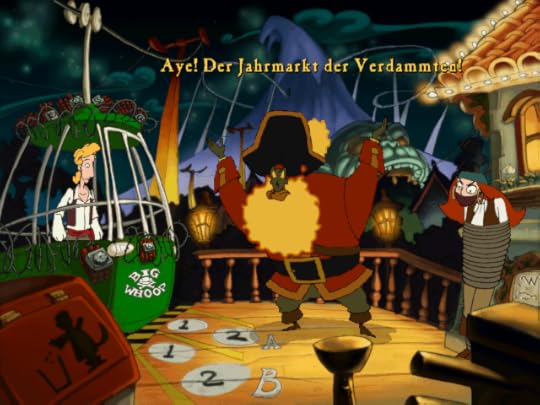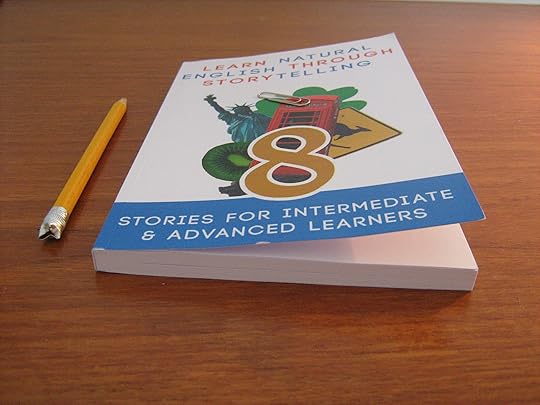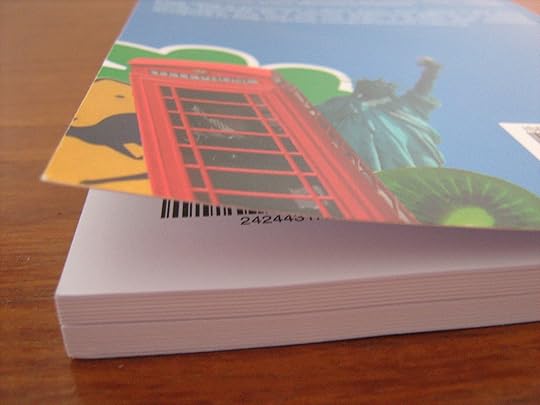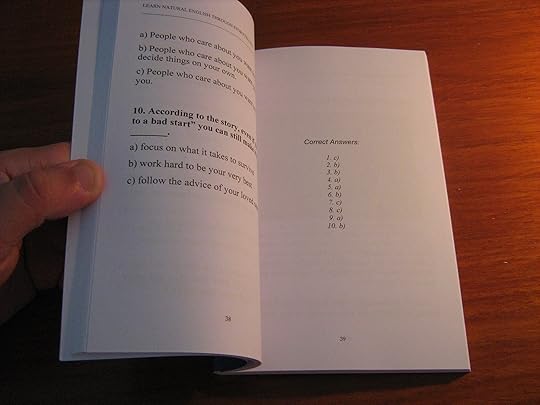André Klein's Blog, page 20
September 10, 2013
Boost Your Vocabulary with The New Kindle Paperwhite Feature
I’m usually not the first one to get all excited about a new version of some piece of hardware, but I’ve noticed a few features of the newly released Kindle Paperwhite which might be very helpful for language learners.
Overall, the new Paperwhite is not that different from the old one, it’s marginally faster and has a marginally better screen, but it comes with a few software updates that will make the Kindle an even more powerful device for learning languages.
Paperwhite Vocabulary Builder Automatically Adds Words To Word List and Creates Flash Cards
Called vocabulary builder, this feature allow you to create custom Flashcards from words you looked up. The new words can be practiced and learned right on the device. How does it work? By using the dictionary or look-up function (tapping on a word), these words are automatically added to a list of words. This list appears as a new book on your shelf called “vocabulary builder”. Opening it shows the words in a list (left image), and by tapping the Flashcards button on the bottom we enter the Flashcards mode (right image).
The above image shows only English words, because by default only the English-English (definitions) dictionary is enabled. But once you activate a foreign language dictionary such as German-English or French-English, it’s easy to see how this vocabulary feature might quickly boost memorization skill. Got a few minutes between subways stops, too little to get into a book, too much to stare at the floor? Why not practice a handful of German words? Once you have learned a word, it can be selected as “mastered” and it will be added to your stacks of “mastered words”.
See the feature in action here:
Instant Translations with Kindle Paperwhite
This is not specifically a new feature of the Paperwhite 2, also the original Paperwhite offered it, but since we’re talking about language-learning related features here, I decided to include it anyway. Powered by Bing Translations readers can now get instant translations of words and phrases without ever having to leave the text itself. Just as Google Translate the result is probably not always perfect, but it’s certainly a good way to start getting one’s head around a paragraph which even after multiple word look-ups still seems impenetrable.
Here’s how it works: While reading a book, tap a word or hold down and select a phrase or paragraph. In the following popup, select More, then tap Translation. Now, simply select your desired language translation pair enjoy your very own Babel fish without sticking anything slippery into your ear.
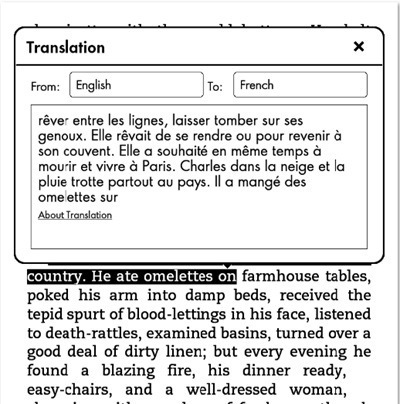
Note: Obviously, for this feature to work, you need to have an active Internet connection. It doesn’t work with 3G but requires an active WiFi nearby, so don’t venture out too far into the wilderness.
What If I have an older Kindle?
If you have the first Kindle Paperwhite you can probably expect to get many or most of the new Paperwhite features with the next software update (if they don’t pull an Apple move and claim that the processor of the older device is not fast enough for the “immensely complex” requirements of these new simple operations)
If you have a Kindle before the Paperwhite, you won’t have either the Instant Translations or Vocabulary Builder feature, but of course you can still install your own custom dictionary. See here (physical Kindle device) and here (Kindle iOS app) on how to get and install custom dictionaries.
And regarding the Flashcards, you can still create your own by using this handy Quizlet -> Kindle converter. It’s not fully automated and requires some list building on your own, but hey, it gets the job done.
-
How To Add a German-English Dictionary To Kindle on Your iPad or iPhone (iOS)
How To Quickly Change Dictionaries on The New Kindle Paperwhite
Use Your Kindle To Learn A Foreign Language
Who Said That Language Learning Shouldn’t Be Fun?
How Not To Learn German Quickly

 About the author:
André Klein was born in Germany, has grown up and lived in many different places including Thailand, Sweden and Israel. He has produced two music albums, performed and organized literary readings, curated an experimental television program and is the author of various short stories and non-fiction works.
About the author:
André Klein was born in Germany, has grown up and lived in many different places including Thailand, Sweden and Israel. He has produced two music albums, performed and organized literary readings, curated an experimental television program and is the author of various short stories and non-fiction works.
The post Boost Your Vocabulary with The New Kindle Paperwhite Feature appeared first on Learn Out Live!.
Boost Your Vocabulary with The New Kindle Paperwhite Flashcards Feature
I’m usually not the first one to get all excited about a new version of some piece of hardware, but I’ve noticed a few features of the newly released Kindle Paperwhite which might be very helpful for language learners.
Overall, the new Paperwhite is not that different from the old one, it’s marginally faster and has a marginally better screen, but it comes with a few software updates that will make the Kindle an even more powerful device for learning languages.
Vocabulary Builder Automatically Adds Words To Word List and Creates Flash Cards
Called vocabulary builder, this feature allow you to create custom Flashcards from words you looked up. The new words can be practiced and learned right on the device. How does it work? By using the dictionary or look-up function (tapping on a word), these words are automatically added to a list of words. This list appears as a new book on your shelf called “vocabulary builder”. Opening it shows the words in a list (left image), and by tapping the Flashcards button on the bottom we enter the Flashcards mode (right image).
The above image shows only English words, because by default only the English-English (definitions) dictionary is enabled. But once you activate a foreign language dictionary such as German-English or French-English, it’s easy to see how this vocabulary feature might quickly boost memorization skill. Got a few minutes between subways stops, too little to get into a book, too much to stare at the floor? Why not practice a handful of German words? Once you have learned a word, it can be selected as “mastered” and it will be added to your stacks of “mastered words”.
See the feature in action here:
Instant Translations
This is not specifically a new feature of the Paperwhite 2, also the original Paperwhite offered it, but since we’re talking about language-learning related features here, I decided to include it anyway. Powered by Bing Translations readers can now get instant translations of words and phrases without ever having to leave the text itself. Just as Google Translate the result is probably not always perfect, but it’s certainly a good way to start getting one’s head around a paragraph which even after multiple word look-ups still seems impenetrable.
Here’s how it works: While reading a book, tap a word or hold down and select a phrase or paragraph. In the following popup, select More, then tap Translation. Now, simply select your desired language translation pair enjoy your very own Babel fish without sticking anything slippery into your ear.

Note: Obviously, for this feature to work, you need to have an active Internet connection. It doesn’t work with 3G but requires an active WiFi nearby, so don’t venture out too far into the wilderness.
What If I have an older Kindle?
If you have the first Kindle Paperwhite you can probably expect to get many or most of the new Paperwhite features with the next software update (if they don’t pull an Apple move and claim that the processor of the older device is not fast enough for the “immensely complex” requirements of these new simple operations)
If you have a Kindle before the Paperwhite, you won’t have either the Instant Translations or Vocabulary Builder feature, but of course you can still install your own custom dictionary. See here (physical Kindle device) and here (Kindle iOS app) on how to get and install custom dictionaries.
And regarding the Flashcards, you can still create your own by using this handy Quizlet -> Kindle converter. It’s not fully automated and requires some list building on your own, but hey, it gets the job done.
-
How To Add a German-English Dictionary To Kindle on Your iPad or iPhone (iOS)
Use Your Kindle To Learn A Foreign Language
Who Said That Language Learning Shouldn’t Be Fun?
How Not To Learn German Quickly
Learn German With Adventure Games

 About the author:
André Klein was born in Germany, has grown up and lived in many different places including Thailand, Sweden and Israel. He has produced two music albums, performed and organized literary readings, curated an experimental television program and is the author of various short stories and non-fiction works.
About the author:
André Klein was born in Germany, has grown up and lived in many different places including Thailand, Sweden and Israel. He has produced two music albums, performed and organized literary readings, curated an experimental television program and is the author of various short stories and non-fiction works.
September 2, 2013
Learn German With Adventure Games
Foreign language learners have access to a wealth of online learning materials, from books to interactive exercises, videos, audio and more. And yet, one key ingredient is still often missing: real world practice. Sure, if you already live in the country where your target language is spoken, there is no excuse. Just go out and dive right in! But if you live in the US and want to learn German, it can be tricky to find opportunities for real life practice (unless you’d like to learn Pennsylvania German).
While there is the option to find practice partners online, today I’d like to show you how you can use classic adventure games to boost your vocabulary and accelerate your listening and reading comprehension. NOTE: The following tutorial applies to German but you could apply the same principle to other languages as well.
Why Learn German With Classic Adventure Games?

While the classic point-and-click adventure genre has been somewhat forgotten in the ever-growing list of immersive 3D action shooters and casual mobile games, it’s far from dead. Many independent game creators who grew up with classic adventures like Monkey Island are actually still making these kinds of games today, bringing us hits like The Journey Down or Sword & Sworcery and introducing younger generations to this classic form of gameplay.
Never played a point-and-click adventure game before? There isn’t really much to say, except: Give it a try. If you love good stories, mind-bending puzzles, quirky dialogues and exploring fantastic landscapes, you will love it. But why are these games good for learning languages, and why German? Aren’t these classic games all English titles?
Adventure Games Are Language and Story-Driven
While many kinds of video games can be used for language learning, adventure games are probably one of the most efficient genres, because adventure games are language and story-driven. Good adventure games are all about getting into the story, asking the right questions, understanding characters and connecting plot points. While modern games rely heavily on graphics, audio and video, classic adventure games had to rely on a lot of text — a fact that we can exploit for language learning.
By wandering around Pinchpenny Island or exploring Maniac Mansion, hovering over items with our cursor we can learn new words within a context and grow our vocabulary for everyday items (and the occasional shrunken head or time machine). It’s like this method of pinning post it-notes with the German words for refrigerator, light switch, table, etc. all over your apartment — only you don’t need to pin any post-it notes.
Secondly, adventure games contain a lot of dialogue. By interacting with different characters in the game, you can choose different dialogue options. It’s not like talking to a real person, yes, but you can replay these dialogues as often as you like — something which is difficult in a real world situation.
Last but not least, there’s the listening bit. While the very old games did not contain any spoken audio, the later ones were already beautifully voiced, presenting us with often stellar voice acting performances by native speakers. And here comes the good news: a lot of these games were fully translated into German, including voice acting. By coupling listening with reading, dialogue, vocabulary and following a good story, this can make for quite an immersive learning experience!
Okay, I get it. Adventure Games are Awesome For Learning German. How Do I start?
Since these games were built to run on older computers, we have to run them through an emulator, but it’s very simple and straightforward and works for both MAC and PC. As far as I know, if you own any of these games, you are allowed* to download a ROM image. If you down’t own any of the original games, you can take a look at the selection of free adventure games here.
Here’s how it works:
First of all, you need to download the ScummV emulator:
Windows ScummVM
Mac OS X ScummVM
other systems
The second step is to download a game, unzip it and then add the game through the ScummV interface by selecting the directory containing the game. It’s fairly simple, but for those who need help, here’s a tutorial.
Ready? Okay, here’s a small selection of games which could be helpful for German language learners:
The Day of The Tentacle (German) – „Der Tag des Tentakels“
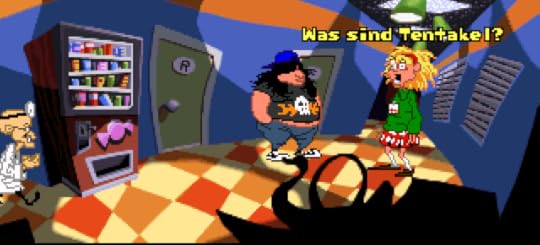
Tentacles are plotting to overthrow the planet. By using a time machine you’ll have to stop them — solving puzzles in both past, present and future. This is one of my all time favorite LucasArts adventure games. The writing and the voice acting is sparkling with brilliance, and the translation to German is just perfect.
full German voice and subtitles
Press F5 to enable subtitles, space bar to pause
subtitle speed (higher value: slower text)
how to obtain the game: Google
Sam & Max Hit the Road (German)

Based on the original comic by Steve Purcell, in this adventure game from 1993 you are playing the role of Sam & Max, hunting all over America after a vanished Yeti. The characters, the artwork and the story are full of quirks — and the German version is done with a lot of love to achieve the same effect like in the original.The German writing isn’t always that easy, but enabling the subtitles helps.
full German voice and subtitles
Press F5 to enable subtitles, space bar to pause
subtitle speed (higher value: slower text)
how to obtain the game: Google
Discworld: The Trouble With Dragons (German)
Based on Terry Pratchett’s Discworld universe, in this game from 1995 you are playing the magician Rincewind. A group of conspirators have awakened a dragon in the city of Ankh-Morpork. It’s your job to find the dragon, uncover the conspiracy and restore glory in the kingdom. The game has been praised for its humor, and it is beautifully voiced and translated to German. The controls differ a bit from other ScummV based games, but you’ll get accustomed quickly.
full German voice and subtitles
Press F1 to enable subtitles (Untertitel)
subtitle speed slider (Anzeigedauer der Untertitel)
how to obtain the game: Google
The Curse Of Monkey Island (German)
This game is the third game in the Monkey Island series and while unfortunately it doesn’t feature any of the brilliant writing by Ron Gilbert, the mastermind behind the first two games and other LucasArts classics, it does come with a nicely upgraded graphical look and completely voiced German speech pack.
If you haven’t played any Monkey Island game before, you may want to start with Monkey Island 1: The Secret of Monkey Island (full German translation, no voice) or the second part: Le Chuck’s Revenge (full German translation, no voice) .While each part can be enjoyed on its own, real fans of the series will want to know how it all comes together.
full German voice and subtitles
Press F5 to enable subtitles, space bar to pause
subtitle speed (higher value: slower text)
how to obtain the game: Google
Full Throttle (German) – “Vollgas”

In this 1995 LucasArts game, set in a dystopian future of biker gangs and anti-gravitational hovercrafts, you are playing a biker named Ben who gets dragged into a corporate conspiracy and is forced to uncover it or be indicted for murder. While the story is shorter than other LucasArts games and there aren’t that many puzzles, this game focuses on creating an immersive cinematic (pixel) experience with many cut-scenes and well-written dialogues. The German translation is excellent and the voice-overs are beautifully done.
full German voice and subtitles
Press F5 to enable subtitles, space bar to pause
subtitle speed (higher value: slower text)
how to obtain the game: Google
The Dig (German)

In this 1995 LucasArts point-and-click adventure game, an asteroid is on a direct collision course with planet Earth. It’s your task to detonate the asteroid before it comes too close. But as you approach the asteroid, you realize that this may not just be a block of stone hurtling through space but an entirely different animal. Originally this story was conceived as a science-fiction movie, but due to financial reasons it was never realized. Hence, this adventure game has a thoroughly cinematic feel which is still there despite the technological limitations. As usual, the German translation and voice-overs are spot on!
full German voice and subtitles
Press F5 to enable subtitles, space bar to pause
subtitle speed (higher value: slower text)
how to obtain the game: Google
The Legend of Kyrandia: Book Two: Hand of Fate (German)
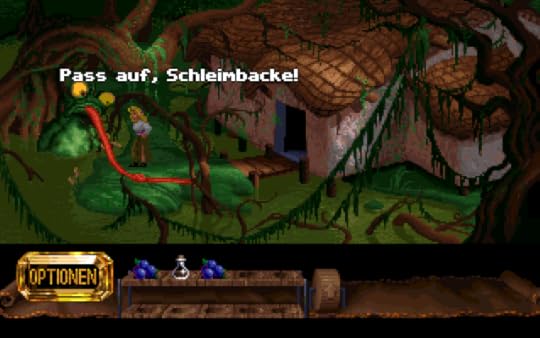
This is the second game of the Kyrandia trilogy. Developed in 1992, you are playing the sorceress Zanthia who is tasked with finding out why the kingdom is slowly vanishing into thin air. While this game only includes English voice-overs, it comes with a full German translation. I decided to include this game here, anyway, because it can be very interesting for learners to hear something in English and see it immediately translated into German. Plus, this classic adventure game is just too good to be ignored!
full English voice and German text/subtitles
Click on “Optionen” > Spielkontrollen to enable subtitles
Textgeschwindigkeit: an/aus (subtitle on/off)
how to obtain the game: Google
Are these all the adventure games available in German?
No way. This is just a small selection, showcasing a few games with full German voice-over which I’ve played myself. There are many more games which are available in German, but come without voice-overs. Take a look at old adventure games sites for more information.
What about other languges?
Many of these games were also translated into French, Spanish, Italian, etc. If you can get your hands on an original copy somewhere, you can download a ROM* to run in ScummV.
Can I play these classic adventure games on iPad or Android tablets, too?
iPad owners: you need a jailbroken iPad, ScummVM and iPhoneBrowser.
Android: download the ScummV app
P.S.: *Although many of these games are no longer offered for sale, it’s illegal to own or download ROM images if you don’t own an original copy of the game. P.P.S.: This blog post doesn’t offer any legal advice.
-
all screenshots: Copyrights belong to the respective owners
How Not To Learn German Quickly
How To Add a German-English Dictionary To Kindle on Your iPad or iPhone (iOS)
Yet Another Free Picture Book For German Learners (And Some Ruminations About Audio-Augmented Ebooks)
How to Learn German With Stories
Crime Pays After All: Rediscovering A Classic Genre

 About the author:
André Klein was born in Germany, has grown up and lived in many different places including Thailand, Sweden and Israel. He has produced two music albums, performed and organized literary readings, curated an experimental television program and is the author of various short stories and non-fiction works.
About the author:
André Klein was born in Germany, has grown up and lived in many different places including Thailand, Sweden and Israel. He has produced two music albums, performed and organized literary readings, curated an experimental television program and is the author of various short stories and non-fiction works.
August 26, 2013
Unboxing Our First Collaboratively Published Storybook for English Learners
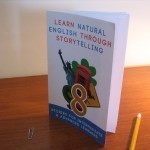 Since I don’t live in one of the “Amazon countries” at the moment, whenever I order books (including my own) there are two choices. I can either order directly from Amazon, pay a shipping price which is double the cost of the book, or I send it to friends and family in Germany and ask them to pass it on.
Since I don’t live in one of the “Amazon countries” at the moment, whenever I order books (including my own) there are two choices. I can either order directly from Amazon, pay a shipping price which is double the cost of the book, or I send it to friends and family in Germany and ask them to pass it on.
Usually this second option is swift and takes less than a week. However, this time the copy of our new book “Learn Natural English Through Storytelling: 8 Stories for Intermediate & Advanced Learners” took almost one month to arrive!
Nevertheless, sometimes it can be worthwhile to wait for something good. With each new book turning from something on my screen into a physical thing, I’m still amazed. This time, I was especially excited, because there were so many people involved in the making of this book. And now, without further ado …
Unboxing
Gallery*
* this book does not include broken pencils and paperclips
-
Why Blogs Can Make Great Books (Writing In the 21st Century)
Time-Tunnel Publishing: Medieval Writing In The Ebook Age
Use Your Kindle To Learn A Foreign Language
An Alternative to Smashwords And The Horrors Of The MeatGrinder
Who Wants To Help Me With This Ebook?

 About the author:
André Klein was born in Germany, has grown up and lived in many different places including Thailand, Sweden and Israel. He has produced two music albums, performed and organized literary readings, curated an experimental television program and is the author of various short stories and non-fiction works.
About the author:
André Klein was born in Germany, has grown up and lived in many different places including Thailand, Sweden and Israel. He has produced two music albums, performed and organized literary readings, curated an experimental television program and is the author of various short stories and non-fiction works.
August 22, 2013
How to Learn German With Stories
German seems to be very popular, these days. Whether it’s the obnoxious “How German sounds compared to other languages” meme (it should actually be called: How German sounds when you are shouting) or the raving popularity of the Nein Quarterly, German seems to be in vogue. And yet, as Adam Fletcher pointed out: “Every foreigner wants to know German. Unfortunately, no-one wants to learn German.”
German has the reputation of being a harsh and difficult language. It’s true that it’s not always easy for beginners (especially for native English speakers) to wrap their head around Wechselpräpositionen, Wortstellung, and other grammatical phenomena which don’t have an equivalent in the learner’s mother tongue.
However, as I mentioned earlier: Since “grammar alone does not a language make” there other ways to unlock the treasure trove of the German language. One of my favorite approaches of helping people to learn German is working with stories.
Stories can draw a learner into the language and boost memorization of words and phrases. A good story encourages students not to be distracted by surface features of a language but to dive deeper and get a feel for structure, flow and wordbuilding.
If you want to find out more about why I think stories are great to learn German (or any language, for that matter), check out this interview that I did with Sylvia Guina this week. Today, I’d like to give a few tips on how to get the most out of learning German with stories.
1. Tickling your Fancy
First and foremost, to get the most out of using stories to learn German, go and find some stories that you are interested in. It may sound obvious, but reading texts that you aren’t interested in won’t do much good, it can even harm the learning process. This is why, before even choosing a story based on its difficulty level, pick something that tickles your fancy!
How to get good German stories?
If you have a Kindle reader you can take a look at my article on how to get free German ebooks on your Kindle, both classic literature and contemporary writing. Since these books are all written for native German speakers, take a look at the first few pages before downloading something. If it seems too difficult, keep on browsing. Hint: The books in the children’s and youth category may use less complicated vocabulary and easier sentence structures.
If even these prove to be too difficult you can also take a look at my own German learning stories, which are designed as a stepping stone to authentic German literature, and come with integrated vocabulary and comprehension questions.
2. Start Your Reading Engines
Okay, so you’ve found a book or a story with an interesting subject. What next? There are a few strategies on how to read stories to get the most out of them.
First of all, prepare yourself for the unknown. This also may sound obvious, but it’s important to acknowledge that you are inevitably going to stumble over difficult words, expressions and sentence constructions. It’s going to happen, no matter what. The only question is how you’ll deal with it.
Depending on the individual there are various strategies. Don’t take the following as fixed advice. These are mere pointers for your consideration:

Let The River Flow
If you want to get the most out a story, you’ll have to establish some kind of Lesefluss (reading flow). You might be reading quickly or slowly, it doesn’t matter — as long as you keep reading. As mentioned before, there will be difficult words. Learn to let them be for now. I’ll talk about translation methods further down.
Don’t stop too long at every unknown or strange word, trying to figure it out. It’s okay not to know. Just keep on reading, flowing steadily, like a river unperturbed by obstacles — just moving on.
You’ll find that some of the unknown bits clarify themselves by continuing to read. You might not be able to translate them into your own language, but you’ll get more or less solid ideas for what they might mean. Through reading flow and context you can glean meaning from the text itself. Sounds impossible? This is how human beings learn language in the first place. We might not be as good at it as infants, but if we can learn to let the unknown just be, many things reveal themselves.
Translation: Use It Like A Spice
However, sometimes the same strange word or expression will keep popping up on page after page. You understand that it’s a key vocabulary to make sense of the story and there’s no use going on without it.
If you’re reading stories on an ereader or tablet, you can get instant translations by clicking/tapping on the word. I’ve become so fond of this simple trick that I often catch myself trying to tap the page of paper books these days — to no avail.
Through these integrated dictionaries you can get instant word translations, without significantly interrupting your reading flow. Should you find yourself looking up every second word, the text might be too difficult or you’ll just have to work on your flow.
If you want to find out how to get translations on your Kindle device take a look here, iPad and iPhone readers check this out.
For readers who don’t have these devices, I recommend the dict.cc German-English dictionary. I can’t speak for other languages, but for German-English it’s just excellent and even lists many idioms and variations.
Building Your Own Dictionary
Last but not least, to further memorize new words, you might want to create a list of the words you translated. Again, it doesn’t make sense to overdo this, because noting down every second word will break the flow and you’ll be unable to really get into the story.
Some words you’ll remember just by reading. Others you’ll translate once and remember immediately. Wordlists can be very powerful to help memorize words that you keep forgetting. While the mere process of writing them down helps already, you can also use these lists for further practice.
A very simple and straightfoward way is to create virtual flashcards from your word lists. By using a tool like Quizlet you can create a set of words for practice. The cool thing about Quizlet is that it has integrated audio, which is surprisingly good for German, so you’ll not only learn the words’ meaning but also their pronunciation.
TL;DR
In short, find something interesting to read, try to get into the flow of the story, translate some words, but not all words, and start building word lists for further study.
Do you learn German (or other languages) with stories? What has been your experience so far? Which tools do you use? Share your thoughts in the comments below!
-
illustrations: HikingArtist.com
How Not To Learn German Quickly
Yet Another Free Picture Book For German Learners (And Some Ruminations About Audio-Augmented Ebooks)
How To Add a German-English Dictionary To Kindle on Your iPad or iPhone (iOS)
Learn German On Kindle With Free Books
Paperback vs Ebook: The Best Of Both Worlds

 About the author:
André Klein was born in Germany, has grown up and lived in many different places including Thailand, Sweden and Israel. He has produced two music albums, performed and organized literary readings, curated an experimental television program and is the author of various short stories and non-fiction works.
About the author:
André Klein was born in Germany, has grown up and lived in many different places including Thailand, Sweden and Israel. He has produced two music albums, performed and organized literary readings, curated an experimental television program and is the author of various short stories and non-fiction works.
August 15, 2013
Should You Convert Your Ebook Yourself, Or Hire A Professional?

In a recent blog post on Teleread, Juli Monroe mentioned an email (probably unsolicited) that advertised ebook-conversion services for “only $400″. The author called the price offer “ludicrous”, arguing that softwares such as Calibre and Scrivener enable authors to do their own ebook-conversion, for free.
The most controversial part of this article (as so often) was in the comment section, where self-described ebook conversion professionals attacked Monroe for sneering at the $400 price tag and recommending Calibre, which according to the pros was just a “hacker software” that produced nothing but a “mushy mess”.
I would like to politely point out that you get what you pay for. If a self-published author, trying to string together the services traditionally supplied by a publishing house, uses hacker software like Calibre to create an ebook, they will have a mushy mess of a book that they paid no money to produce.
You Get What You Pay For
These kinds of arguments are predictable. It’s like telling a group of dedicated language teachers that in a few years algorithms à la Google Translate will do most of their work for them. They will roar back at you that machine translations will never match the finesse of human language processing, that they are prone to grave errors and professionally unacceptable!
So, first of all it’s no surprise that professional ebook conversion specialists will not accept an ebook created with freely or commonly available software. It’s a matter of defending their territory.
However, what this whole discussion fails to address is that ebook-conversion (like so many other things in life) is not a zero-sum game. It’s not about either free conversions or professionally produced ebooks by digital typesetters (for lack of a better term).
For many authors with a limited budget and not unusually complex layouts, a free ebook conversion solution will be sufficient most of the time. If the author does his homework, he’ll make sure that his book looks the same on as many devices as he possibly has access to through either hardware or software simulators such as the Kindle Previewer.
Will the code behind the ebook be as immaculate as that of a hand-crafted HTML-document with carefully pruned Cascading Style Sheets? No. Will the reader care? As long as it doesn’t interfere with his reading experience, probably not.
However, when it comes to publishing houses who have both unusually complex (text-)books and a budget to spend, free conversion will often be not sufficient. When there are complicated elements within the book such as tables, formulas, indeces, footnotes and so on, hiring a professional will not only produce better results, it will also save time, since fixing the results of an automatically converted ebook will take much longer than just creating a clean ebook from the start.
Custom-Tailored Or Off-the-Rack
In the end, it’s all a question whether you want your ebook conversion “custom-tailored” or “off-the-rack”. Both have their advantages. If you want the best-fitting, best-looking (according to your wishes) thread you can get, there’s nothing like going to a tailor and ordering a custom suit. Most people, however, will just buy their clothes in their favorite shop around the corner which fits both budget and expectations. It’s fast, simple and affordable. (Plus, you can always customize the result if you feel up to it.)
There is not just one solution which is always right for everyone. There are different solutions for different people in different situations. If both professionals and pragmatists acknowledge this, there is no reason to be upset.
-
photo: Some rights reserved/CC by arminho-paper via flickr
An Alternative to Smashwords And The Horrors Of The MeatGrinder
Why FREE and PAID Don’t Contradict
Print On Demand Revisited: Lulu vs. CreateSpace
Track Indie Book Sales Reports The Easy Way and Visualize Your Data
How To Patch The Summer Hole

 About the author:
André Klein was born in Germany, has grown up and lived in many different places including Thailand, Sweden and Israel. He has produced two music albums, performed and organized literary readings, curated an experimental television program and is the author of various short stories and non-fiction works.
About the author:
André Klein was born in Germany, has grown up and lived in many different places including Thailand, Sweden and Israel. He has produced two music albums, performed and organized literary readings, curated an experimental television program and is the author of various short stories and non-fiction works.
August 9, 2013
How To Add a German-English Dictionary To Kindle on Your iPad or iPhone (iOS)

One of the great benefits of using ebooks for language learning is the ability to use custom dictionaries. Instead of having to search for each unknown word in a dictionary you can get instant translations while reading your book.
If you own a Kindle Paperwhite or Kindle Touch and have installed a dictionary, you can translate words in the text just by tapping them. For other non-touch Kindle devices, you can simply move the cursor over the words.
But what about the iPad and iPhone? A recent study conducted by Goodreads shows that a whopping 86% percent of tablet owners use them to read books, while 32% don’t read anywhere else! Kindle has been updating their iOS app many times this year. Among the latest updates was the ability to add “custom dictionaries”, but it just means that you can install same-language dictionaries so that you can get word definitions in one language, not translations from one to another.
So, do iPad and iPhone readers have to live without instant translations? Fortunately, there is a workaround to still get German-English (or any other pair for that matter) dictionaries on your Kindle iOS app.
1. Download the Dictionary
First of all, you need to download a good dictionary. You can get a basic German-English dictionary for free here. Keep in mind that Kindle dictionaries are one-way so in our example case we’ll need to download the dictionary which says “German-English”.
Once you have downloaded the dictionary, we need to rename it so the Kindle app will recognize it. Change the filename from German-English.mobi to B003YL4LVQ_EBOK.azw so the app will recognize it.
2. Access Your Device’s Filestructure
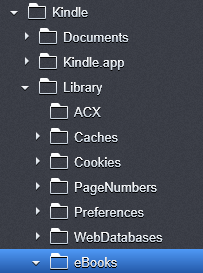 For the next step we’ll need to get access to your iPad’s or iPhone’s inner file structure. Don’t worry, there’s no jailbreaking involved. All you need is to download a little tool called iexplorer or phoneview (the demo or trial version will be enough for our purposes).
For the next step we’ll need to get access to your iPad’s or iPhone’s inner file structure. Don’t worry, there’s no jailbreaking involved. All you need is to download a little tool called iexplorer or phoneview (the demo or trial version will be enough for our purposes).
After installing and starting the program, go to Apps > Kindle > Library > Ebooks
Simply drag your dictionary into this folder. If you already have the German definitions dictionary installed, the program will tell you that the file already exists. You can either overwrite it or backup the standard dictionary somewhere before you drop your German-English dictionary into the folder.
3. Enjoy Instant Translations
That’s it. You can now get instant translations in any German ebook. Simply tap the word and you’ll see a little popup:
Pretty cool, isn’t it?
How To Get Other Dictionaries For Other Languages
If you want a French-English dictionary, the process is the same, except for the new file name in step 1. Here are the correct file names you need to enter before copying your dictionary to the device.
Spanish: B005F12G7O_EBOK.azw
French: B005F12G6U_EBOK.azw
Italian: B005F3XOMI_EBOK.azw
(For more languages, simply click on the little i in your Kindle app, download one of the dictionaries and then take a look under iExplorer which file was added most recently to the ebooks directory. Voilá!)
-
source: wer98, photo: :ray via flickr Creative Commons
Learn German On Kindle With Free Books
How Not To Learn German Quickly
Use Your Kindle To Learn A Foreign Language
Yet Another Free Picture Book For German Learners (And Some Ruminations About Audio-Augmented Ebooks)
Ebooks Beyond Boundaries: How To Publish For People, Not Monopolies

 About the author:
André Klein was born in Germany, has grown up and lived in many different places including Thailand, Sweden and Israel. He has produced two music albums, performed and organized literary readings, curated an experimental television program and is the author of various short stories and non-fiction works.
About the author:
André Klein was born in Germany, has grown up and lived in many different places including Thailand, Sweden and Israel. He has produced two music albums, performed and organized literary readings, curated an experimental television program and is the author of various short stories and non-fiction works.
July 30, 2013
Learn Better English Through Storytelling

If you speak English, the world is yours, whether in business, academics, technology or on public internet forums. If you were born into an English speaking country, good for you. If not, you probably had to work hard to acquire the English language, or you are still working on it.
Today I want to talk a bit about how I learned English and why I’m convinced that storytelling is one of the best ways to learn English, or any language, for that matter.
Also, the collaboratively published book I spoke about last week “Learn English Through Storytelling: 8 Stories for intermediate and advanced learners” is now officially released, and you can get it for free for the next three days. Skip to the bottom for the download links.
Coffee, Cigarettes and Hemingway
I had many English teachers in high school. Most of them spent their time having us fill in worksheets, conjugate tenses “sit, sat, sat — sleep, slept, slept …” and so on and so forth. It’s important to learn about grammar, to get a glimpse into structures and expressive varieties within a language, but grammar alone does not a language make.
My breakthrough in English happened when we got a new teacher from America who was actually a professor specialized on Hemingway. Not only didn’t he speak a single word of German (our mother tongue), but he had a completely different teaching method. There were the occasional worksheets, but his practice mainly consisted of two things: letting us watch movies in class and urging us to borrow books from his private library.
Outwardly, this method didn’t look like much. When he switched on the television, he generally left the classroom for the rest of the lesson to seclude himself in the teacher’s room with cigarettes and black coffee, only to return minutes before the bell rang. On the other hand, no other teacher could have left the classroom and not have us explode in complete anarchy. In English class, however, we sat silently like lambs, enthralled by the latest Hollywood blockbuster on the screen in front of us.
With his books it was similar. The more books a student borrowed, the better his grade became, regardless of whether anyone had actually read them. And yet, many of us did. For me, it was the beginning of a long line of English reading which continues up to this day.
From Gibberish To Greatness
In Germany most movies are dubbed, so when I watched my first movies in English as a teenager, I didn’t understand much. The actors were speaking too fast, using words I didn’t know, their voices laced with heavy accents from Cockney to Texan. With reading it was very similar. When I went through my first English books, I understand only parts of each sentence. The rest was hovering between vague hunches and complete gibberish.
And yet, I continued watching movies and reading English books. Why? For a simple reason — I wanted to see what would happen next. It sounds very simple, but it can be a great motivating force. Everyone who has ever learned a language knows that motivation is key. And so I continued on my way, making sense of parts of a story, putting the pieces together in my mind as I went along.
Eventually, the movies and books started making more sense. When I watched or read them a second and third time I often experienced a completely different story, because I had missed many parts the first time and replaced them with my imagination. In fact, some books had been a lot better when I read them in poor English, because I’d been making the parts I didn’t understand more interesting than they actually were.
From Learner To Teacher
The experience of learning English with books and movies has been so powerful that I’ve adopted storytelling as a primary teaching method in my work as a German language instructor.
Since last year I published three detective stories and an interactive fantasy trilogy, all designed for German learners. The feedback I received so far was overwhelmingly positive. People are tired of doing yet another “fill-in-the-gap” exercise, they want to experience a language, not just dissect it under a grammarian’s microscope.
So in May this year I decided to invite some of my colleagues to write a storytelling book together for English learners. You can find out more about this project here and here. Starting today, the book is available for free (until August, 1st) on Amazon as a digital download for your smartphones, e-readers, tablets and desktop computers.
Share it with your friends, and if you like it, leave us a quick review! Here are the links:
Click here or on the country code of your local Amazon: US | UK | DE | FR | ES | IT | CA | IN | JP
-
photography: Some rights (CC) reserved by Paul Anglada via flickr
Who Said That Language Learning Shouldn’t Be Fun?
4 Quick Ways To Use (Social) Media In Foreign Language Teaching
Your Brain On Storytelling: Foreign Language Learning Through Stories
The Great Firewall Of Foreign Language
Housing Swap: Learn A Language By Immersion

 About the author:
André Klein was born in Germany, has grown up and lived in many different places including Thailand, Sweden and Israel. He has produced two music albums, performed and organized literary readings, curated an experimental television program and is the author of various short stories and non-fiction works.
About the author:
André Klein was born in Germany, has grown up and lived in many different places including Thailand, Sweden and Israel. He has produced two music albums, performed and organized literary readings, curated an experimental television program and is the author of various short stories and non-fiction works.
July 25, 2013
10 People, 5 Continents: One Book
When I first quit my day-job three years ago to work full-time on the Internet, there was a sense of being on my own. I did know a few people from online teaching platforms which were encouraging communal activity on their forums, but the spirit of these communities often seemed limited by the business under whose roof they resided.
In other words: I never quite felt “at home” in these places, walled off from the rest of the Internet through logins and passwords. So, instead of hanging around these digital fortresses, I started building connections with individuals, based on my writings, online teaching jobs or other endeavors.
One of these individuals was Kirsten Winkler, who had the brilliant idea (among many others) to create a community where “Edupreneurs” like us could gather outside of a particular platform or branded forum. And it was not long before I met many of the people I’d gotten to know through my online work all over the net again in Kirsten’s community.
It became a place for us to share articles with each other, give and get feedback about our projects and just be silly once in a while. Each of us brought our own unique interests and connections to the group and we got to know each other better.
From Talking And Sharing To Doing Things Together
An entrepreneur may recognize different social worlds and might be a kind of peripheral member of different social worlds, but unless they have a place to bring those people together, those worlds never actually meet. When they meet, they need to not only come together in some place. They need to do something together. – Fred Turner, interviewed by Howard Rheingold in Netsmart, page 224
I’m convinced that while talking and sharing information is great, it’s not enough to create a community. It’s only when people start doing things together that a community reveals its true nature. It’s very easy to hide behind academic debates, dazzling CVs and awards, but once you get together to work on a project, you get to know the person behind the persona.
The Edupreneurs Club has led to many collaborations in the past, whether it was Kirsten’s invitation to participate in writing for fairlanguages.com, or the first Language Learning Today Conference which took place in June this year.
But despite all the online collaborations, our group hadn’t yet had any “real world” impacts. (I use this term with caution, since it implies that everything which happens online is “not real”, which is utterly untrue.) A physical gathering seemed unlikely due to the immense geographical distances between us. So, one day while doing the dishes, I had an idea. What if we were to create a book together? Not just an ebook (that, too) but a “real” paper book we could put on our shelves all over the world and point to it, saying: Look! We did this!
This was exactly two months ago on May 25th. The idea was to create a storybook for English learners, presented in a way which is structured enough to be helpful for learners while also giving the authors enough freedom to do whatever they please.
It was an experiment. Could we bring together 10 different people from five different continents that had never met before in real life and write, edit and publish a book together?
Apparently, yes …
We’re now only a few days away from the official launch of this book on Tuesday the 30th. We’ll kick it off with a free promotion for the ebook so anyone who’s interested can get a copy.
At this point, I also want to say thank you to everyone who contributed to this book, every member of the Edupreneurs Club and of course Kirsten Winkler, without whom none of this would have been possible.
-
Who Wants To Write A Book With Us?
Three Ways to Leave a Legacy in the Land of Online Learning
5 Things Everybody Ought To Ask About The New School Year
The Internet is not a Mass Medium. Or is it?
Viral Education 2.0 [video]

 About the author:
André Klein was born in Germany, has grown up and lived in many different places including Thailand, Sweden and Israel. He has produced two music albums, performed and organized literary readings, curated an experimental television program and is the author of various short stories and non-fiction works.
About the author:
André Klein was born in Germany, has grown up and lived in many different places including Thailand, Sweden and Israel. He has produced two music albums, performed and organized literary readings, curated an experimental television program and is the author of various short stories and non-fiction works.
July 19, 2013
The Emptiness Of Branded Experience

We’re living in a hyper-branded world. Our food, our clothes, our electronics, our software: everything is branded. Americans mention brands more than 3 billion times a day. Whether we are aware of it or not, brands are affecting our experience almost at all times.
What’s In A Brand
Once upon a time a brand used to be logo, a name: a simple tag. Nowadays, brands have become something much more intangible and emotional. Seth Godin defines brand as follows:
brand is the set of expectations, memories, stories and relationships that, taken together, account for a consumer’s decision to choose one product or service over another.
The stronger these emotional ties to a brand are, the more a consumer is willing to pay. Companies are aware of this and spend billions of dollars to shove their brands into our faces at all times to constantly reinforce our emotional response.
In a sense, the brand experience is a kind of virtual reality, because our actual expectations and memories related to a particular brand quickly get entangled and overlayed with the prescribed expectations and memories that particular brand is trying to establish.
The experience of a Product
Mark Wilson wrote an interesting article on Co.Design about an Apple advertising spot. The advertising begins with the words: “This is it. This is what matters. The experience of a product.”
The rest of the (rather unimaginative spot) consists of people turning their attention away from the world around them to the shiny devices in their hands.
Wilson writes:
In what should be a warm, humanizing montage, people are constantly directing their attention away from one another and the real, panoramic world to soak in pixels. They’re choosing the experience of their products over the experience of other people several times in quick succession. And Apple has a warm voice in the background, goading us on.
The point Wilson is trying to make, is that Apple favors the “virtual” technology-enabled experience over the “real” physical experience, a criticism that is quickly dismantled with the Digital Dualism argument. However, he still has a point, because what this advertising really does is favor the virtual brand-enabled experience over the unbranded mundane experience.
To understand that, we’ll have to take a look at that opening line again: “This is what matters. The experience of a product.”
It’s not a mistake that they didn’t write “the experience of a person”, because ultimately this is not what brands are about. People are secondary, we are just receptacles for the brand experience. In a world where increasingly “people are the product”, our experiences don’t belong to us anymore. They are assimilated into the brand and fed back to us through ads like the above.
The exact same thing can be seen in the Facebook Home ads, by the way: people turning away from a boring surrounding to their mobile devices. This is not about escaping into a digital world away from the real world, this is about feeding us back our own emotional brand responses.
The fact that people overlook this simple fact so often just proves how much we are affected by brands. We almost don’t notice them, they become invisible through their hyper-visibility, and yet they are subconsciously guiding our decisions and opinions. No matter what they might make us feel, brands are after all just carefully engineered complex corporate constructs with a simple function: to make us buy stuff.
Brands As Virtual Reality
Brands make us feel things. They make us feel successful, creative, young and loved. The promise is always the same, that by participating in the brand experience we can own these emotions connected to the brand. To make these feelings our own, all we have to do is purchase the product. Brands don’t care about who we are, they care about who we want to be. It’s a make-belief world. Brands, in the end, despite all their emotional load are utterly self-referential.
Take Facebook for example. The brand here is all about warm and fuzzy feelings of “connecting people” and “making the world a better place”. These emotions are reinforced by advertising and through the way the product operates, and yet, in reality Facebook as a business is about one thing: trading personal data for advertisers’ money.
Brands tell us that we are unique, but in our belief of brand-enabled uniqueness we are all the same.
There is a brand for everyone, from corporate drones to anti-establishment occupiers, from wallflowers to vamps.
When we use brands to express ourselves, we are telling the world who we want to be. This is not self-expression, it’s wishful thinking.
In the end, maybe the Internet is (once again) not the problem. Talking to people through the Internet is not a “virtual” experience — somehow half or less real than a physical encounter. There are of course varying degrees of intensity and modes of communication, but nobody would say that a phone call or a hand-written letter is “unreal”.
Perhaps our concern about the online world being artificial and unreal doesn’t stem from the technology, but from the way brands have infused these technologies with their perceived realities.
In that sense, maybe what we really need is not a “digital sabbatical”, but a brand detox, a time-out from constructed emotions that are ultimately as meaningless and nutrient-less as a whiff of vacuum …
-
img: Some rights reserved by somedesignerguy
How Social Media Leads to “Social Crash”
Why You Can’t Escape From The Internet
The New Facebook: Your Life Story in Likes Or: The Perfect Surveillance Machine
Are We Using Social Media Or is Social Media Using Us?
After The Hype: The Web Is Growing Up

 About the author:
André Klein was born in Germany, has grown up and lived in many different places including Thailand, Sweden and Israel. He has produced two music albums, performed and organized literary readings, curated an experimental television program and is the author of various short stories and non-fiction works.
About the author:
André Klein was born in Germany, has grown up and lived in many different places including Thailand, Sweden and Israel. He has produced two music albums, performed and organized literary readings, curated an experimental television program and is the author of various short stories and non-fiction works.







